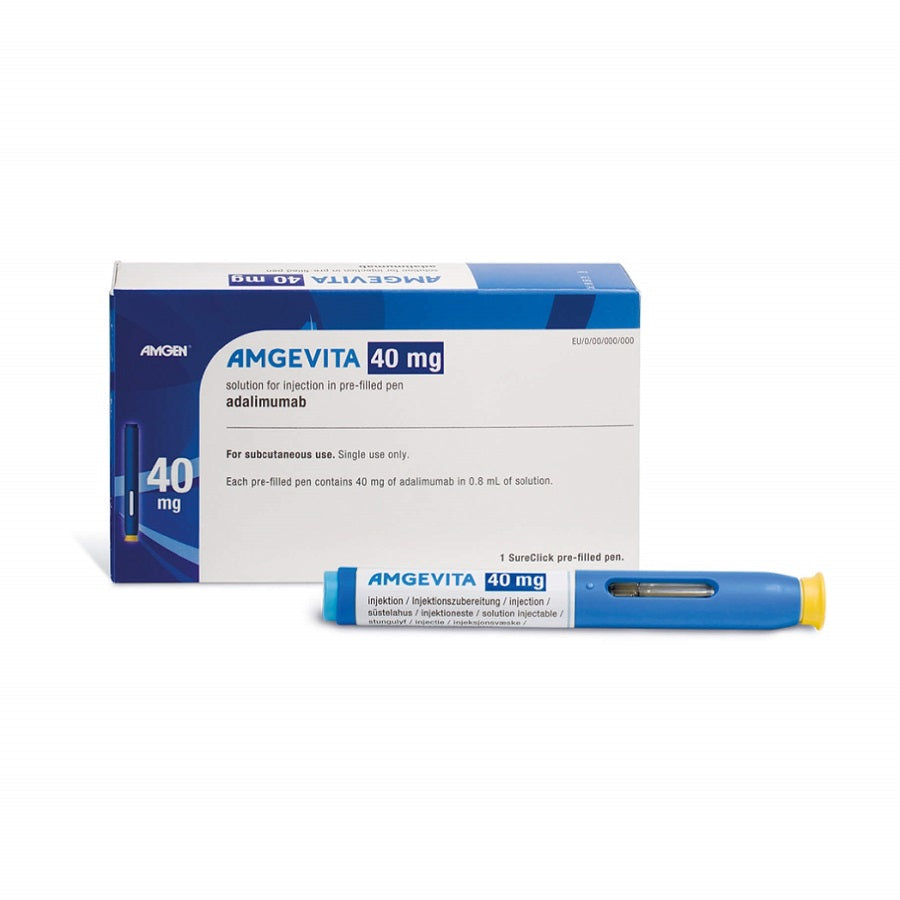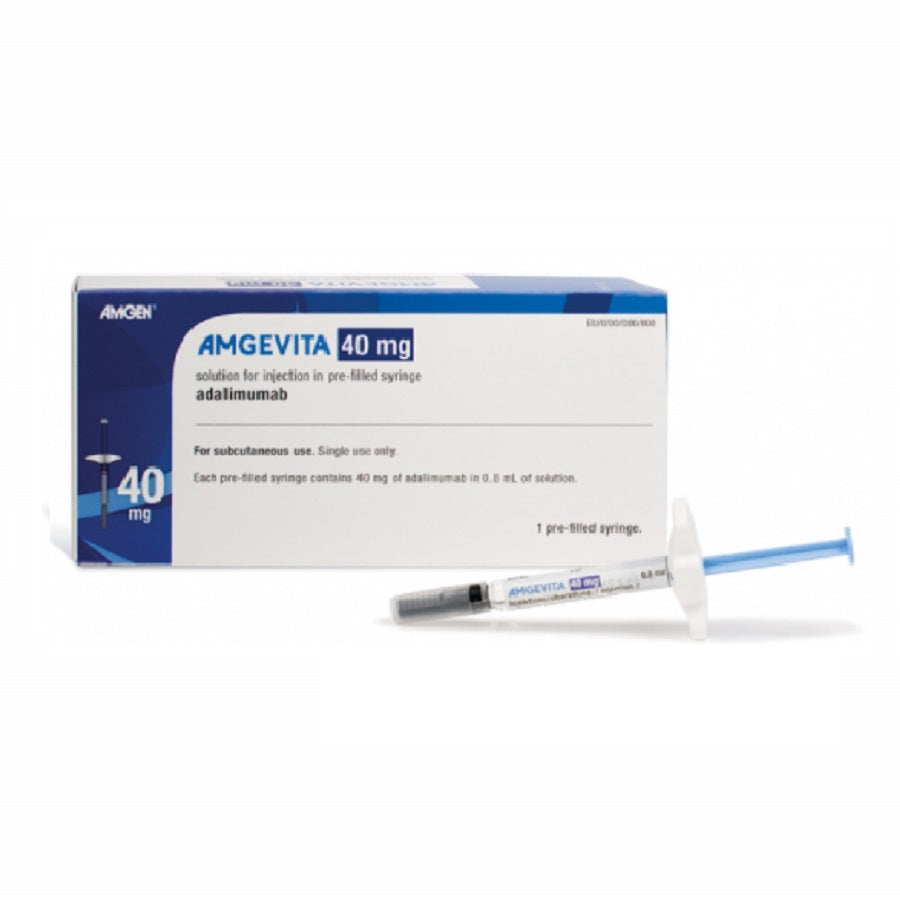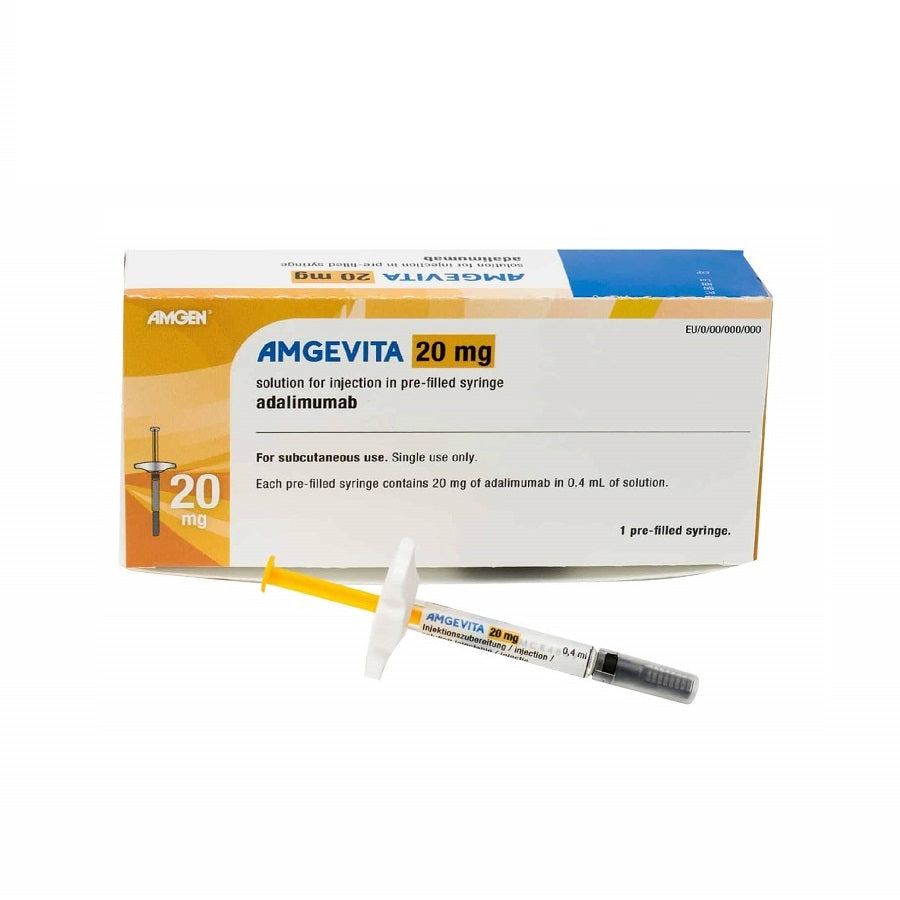AMGEN
AMGEVITA (Adalimumab)
AMGEVITA (Adalimumab)


Couldn't load pickup availability
What is this medication?
Adalimumab, Humira/Biosimilars (Amgevita/Cyltezo)
Antirheumatic, Disease Modifying Agent, Gastrointestinal agent, Immunosuppressant, Monoclonal Antibody
Officially indicated for ankylosing spondylitis, Crohn disease, hidradenitis suppurativa, juvenile idiopathic arthritis, plaque psoriasis, psoriatic arthritis, rheumatoid arthritis, ulcerative colitis, and uveitis depending on which product is used.
Brand Name US: Amjevita
Canadian Label: Amgevita
How does this medication work?
Adalimumab/Humira is a recombinant monoclonal antibody that binds to free and transmembrane forms of tumor necrosis factor alpha (TNFα), thereby inhibiting cytokine-driven inflammatory reactions. A reduction in endogenous TNFα activity will reduce proinflammatory mediators (i.e. interleukins), leukocyte migration, neutrophils and eosinophils activation.
Adalimumab/Humira will reduce TNFα levels in the synovial fluid which causes the pathologic pain and joint destruction in immune-mediated arthritis. Adalimumab/Humira decreases signs and symptoms of psoriatic arthritis, rheumatoid arthritis, and ankylosing spondylitis. It inhibits progression of structural damage of rheumatoid and psoriatic arthritis. Adalimumab/Humira reduces signs and symptoms and maintains clinical remission in Crohn disease and ulcerative colitis; reduces epidermal thickness and inflammatory cell infiltration in plaque psoriasis.
How should I take this medication?
Ankylosing Spondylitis
SQ: Inject 40mg every other week
Crohn Disease
SQ: Inject 160mg (on day 1 or split and give over 2 consecutive days), then give 80mg 2 weeks later. Maintenance dose is 40mg every other week beginning on day 29.
Hidradenitis Suppurativa
SQ: Inject 160mg (on day 1 or split and give over 2 consecutive days), then give 80mg 2 weeks later. Maintenance dose is 40mg every other week beginning on day 29.
Plaque Psoriasis
SQ: Initial inject 80mg as a single dose then inject 40mg every other week beginning 1 week after the first dose.
Psoriatic Arthritis
SQ: Inject 40mg every other week
Rheumatoid Arthritis
SQ: Inject 40mg every other week
Ulcerative Colitis
SQ: Inject 160mg (on day 1 or split and give over 2 consecutive days), then give 80mg 2 weeks later. Maintenance dose is 40mg every other week beginning on day 29.
Uveitis
SQ: Initial inject 80mg as a single dose then inject 40mg every other week beginning 1 week after the first dose.
How to Take: Inject subcutaneously at separate injection sites in the thigh or lower abdomen (avoid injecting 2 inches within the navel); rotate the injection sites. May leave at room temperature for ~15 to 30 minutes prior to use; do not remove cap or cover while allowing product to reach room temperature. Do not use if solution is discolored or contains particulate matter. Do not administer to skin which is red, tender, bruised, hard, or that has scars, stretch marks, or psoriasis plaques. Needle cap of the prefilled syringe or needle cover for the adalimumab pen may contain latex. Prefilled pens and syringes are available for use by patients and the full amount of the syringe should be injected (self-administration); the vial is intended for institutional use only. Vials do not contain a preservative; discard unused portion. Citrate-free formulations may be associated with less pain on injection.
What should I watch for while using this medication?
Increase risk of developing an autoimmune disorder
Increased risk for serious infections
Use with caution in patients with pre-existing or recent onset CNS demyelinating disorders, heart failure, hepatitis B carrier
Do not use in patients who have active or latent tuberculosis
“ALERT: US Boxed Warning
Serious infections:
Patients treated with adalimumab are at increased risk of developing serious infections that may lead to hospitalization or death. Most patients who developed these infections were taking concomitant immunosuppressants, such as methotrexate or corticosteroids.
Discontinue adalimumab if a patient develops a serious infection or sepsis. Reported infections include the following:
Active tuberculosis (TB), including reactivation of latent TB. Patients with TB frequently have presented with disseminated or extrapulmonary disease. Test patients for latent TB before adalimumab use and during therapy. Initiate treatment for latent infection prior to adalimumab use.
Invasive fungal infections, including histoplasmosis, coccidioidomycosis, candidiasis, aspergillosis, blastomycosis, and pneumocystosis. Patients with histoplasmosis or other invasive fungal infections may present with disseminated, rather than localized, disease. Antigen and antibody testing for histoplasmosis may be negative in some patients with active infection. Consider empiric antifungal therapy in patients at risk of invasive fungal infections who develop severe systemic illness.
Bacterial, viral, and other infections caused by opportunistic pathogens, including Legionella and Listeria.
Carefully consider the risks and benefits of treatment with adalimumab prior to initiating therapy in patients with chronic or recurrent infection.
Monitor patients closely for the development of signs and symptoms of infection during and after treatment with adalimumab, including the possible development of TB in patients who tested negative for latent TB infection prior to initiating therapy.
Malignancy:
Lymphoma and other malignancies, some fatal, have been reported in children and adolescents treated with tumor necrosis factor (TNF)–blockers, including adalimumab. Postmarketing cases of hepatosplenic T-cell lymphoma (HSTCL), a rare type of T-cell lymphoma, have been reported in patients treated with TNF-blockers, including adalimumab. These cases have had a very aggressive disease course and have been fatal. Most reported TNF-blocker cases have occurred in patients with Crohn disease or ulcerative colitis and the majority were in adolescent and young adult males. Almost all these patients had received treatment with azathioprine or 6-mercaptopurine concomitantly with a TNF-blocker at or prior to diagnosis. It is uncertain whether the occurrence of HSTCL is related to use of a TNF-blocker or a TNF-blocker in combination with these other immunosuppressants.”
What if I miss a dose?
If you forget to take a dose, inject a dose as soon as you remember. Then, take your next dose at your regular scheduled time. This will put you back on schedule. In case you are not sure when to inject, call your doctor or pharmacist.
How should I store this medication?
Stored in a refrigerator (2°C-8°C/36°F-46°F) in its original container and protected from light until it's used. HUMIRA should never be put in the freezer or frozen. Do not use if frozen, even if it has been thawed.
What are the possible side effects of using this medication?
The most common side effects reported in using Adalimumab/Humira include:
>10%:
Central Nervous System: Headache (12%)
Dermatologic: Skin rash (6% to 12%)
Hematologic & Oncologic: Positive ANA titer (12%)
Immunologic: Antibody development (3% to 26%)
Infection: Infection (children and adolescents: 45%)
Local: Injection site reaction (5% to 20%)
Neuromuscular & Skeletal: Increased creatine phosphokinase (15%)
Respiratory: Upper respiratory tract infection (17%), sinusitis (11%)






